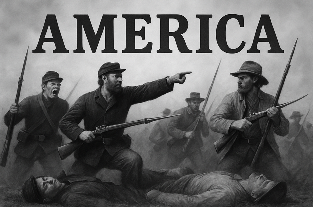Introduction
The American Civil War, which lasted from 1861 to 1865, is still one of the most important events in US history. The war split the country into two parts: the Union in the North and the Confederacy in the South. The main problems were slavery, states’ rights, and the power of the federal government.
This awful conflict killed more than 620,000 Americans. It ended slavery, held the Union together, and began a long and hard process of rebuilding and making peace. This page talks about why the Civil War started, the most important battles, the most important characters, and what happened as a result.
Table of Content
- caused the American Civil War
- The States in the South Going Away
- The Civil War Begins (1861)
- Important Battles and Changes in the War
- Key generals and leaders
- The Role of Slavery and Freedom
- The End of the War (1865)
- The Effects of Reconstruction
- Long-Term Effects on the US
- Last Words
What caused the American Civil War
There were a lot of nuanced and connected reasons why the American Civil War started. The American Civil War, major battles, key leaders, and how it ended slavery and reshaped the future of the United State

1.1 Slavery
The main factor that divided the North and the South was slavery. The South’s economy relied heavily on slaves, particularly for cotton cultivation, whereas the North was becoming more industrialized and opposed to slavery.
1.2 The Rights of States and the Power of the Federal Government
The Southern states believed they had the authority to manage their own affairs, including the maintenance of slavery. The federal government, which was being run more and more by politicians who were against slavery, didn’t agree.
1.3 Differences in the economy
The South depended on farming and slavery, while the North depended on manufacturing and free labor. People had distinct ideas about tariffs, trade, and infrastructure because of these divisions.
1.4 The election of Abraham Lincoln in 1860
In 1860, people in the South were scared when Abraham Lincoln, a member of the anti-slavery Republican Party, became president. A lot of people were scared he would remove slavery, which made people want to leave the country.
The Union is abandoning the South
From December 1860 to June 1861, 11 Southern states quit the Union and formed the Confederate States of America, with Jefferson Davis as president.
These were:
- South Carolina
- Mississippi
- The state of Florida
- Alabama
- Georgia
- Louisiana
- Texas and
- Virginia
- Arkansas
- North Carolina
- Tennessee
The Civil War Begins (April 1861)
The conflict started on April 12, 1861, when Confederate troops shot at Fort Sumter in South Carolina. In response, President Lincoln asked for 75,000 people to help put down the uprising. This marked the commencement of a civil war that lasted four years.
Key Battles and Turning Points
In July 1861, the Battle of Bull Run happened. The first great fight, which took place in Virginia, was won by the Confederates. This stunned the North and suggested that the conflict would go on for a long time.
Battle of Antietam (September 1862)
Battle of Antietam (September 1862) More than 22,000 people died or were hurt in the fight, making it the bloodiest in U.S. history. It didn’t help him win the war, but it did give Lincoln the push he needed to write the Emancipation Proclamation.
Battle of Gettysburg (July 1863)
A very important time in the conflict. The Union’s victory stopped Confederate General Robert E. Lee’s assault of the North and made people in the North feel better.
The Siege of Vicksburg took place from May to July 1863. General Ulysses S. Grant of the Union conquered Vicksburg, which gave him control of the Mississippi River and divided the Confederacy in two.
Sherman’s March to the Sea (1864)
General William Tecumseh Sherman of the Union launched a “total war” campaign that destroyed the South’s infrastructure in Georgia and the Carolinas.
Important generals and commanders
Abraham Lincoln (Union president)
Abraham Lincoln, the Union president was in charge of the Union. His goal was to keep the country together and eventually eradicate slavery.
Ulysses S. Grant (Union general)
Ulysses S. Grant was the Union general. He was highly brilliant in strategy and fought hard to win the war. He later served as the 18th president of the United States.
Robert E. Lee (Confederate general)
Robert E. Lee was a Confederate general. He was well-known for his military skills and led the Confederate Army with honor until he gave up at Appomattox.
The Significance of Slavery and Liberty
- On January 1, 1863, President Lincoln signed the Emancipation Proclamation.
- It declared that all slaves who lived in areas controlled by the Confederacy were free.
- It didn’t eradicate slavery immediately, but it did transform the war’s moral focus to ending slavery.
- Prevented European countries from supporting the Confederacy.
- More than 200,000 African Americans joined the Union Army.
The War’s End (1865)
By the start of 1865, the Confederate troops were quite tired.
April 9, 1865
General Robert E. Lee gave up to Ulysses S. Grant at Appomattox Court House, which ended the Civil War.
Lincoln died on April 14, 1865
Five days later, John Wilkes Booth shot and killed President Lincoln, which made everyone in the country sorrowful
The Reconstruction Era
- The purpose of the Reconstruction Era (1865–1877) was to rebuild the South.
- Let free slaves be a part of society.
Make sure that new laws and civil rights are followed.
- The 13th Amendment was one of the most important changes: Put an end to slavery.
- 14th Amendment: Gave citizenship to people who used to be slaves
- Fifteenth Amendment: Allowed Black men to vote
But the Ku Klux Klan (KKK) also grew during Reconstruction. Laws like Jim Crow and the Black Codes Tensions between races and politics that would last for a long time
Long-Term Effects on the US
The Civil War had a lasting impact on the US: Kept the Union together and ended slavery in the US. Gave the federal government more power Changed the economy and the armed forces. Get ready for the Civil Rights Movement. It also caused deep wounds in the areas and cultures that are being felt today.
Last Words
The American Civil War was more than just a war for land; it was a fight for the country’s character. It put the ideas of democracy, freedom, and equality to the test. The U.S. came back together after a lot of battle, bravery, and leadership, but it was never the same again. Today, the war’s legacy is still vitally essential for understanding race, justice, and identity in the U.S. Discover what sparked the American Civil War, major battles, key leaders, and how it ended slavery and reshaped the future of the United State
